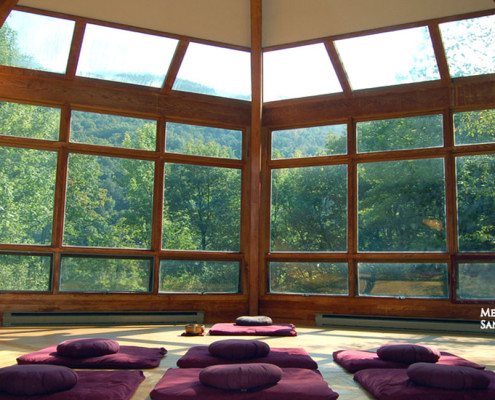June the 21st was declared to be International Yoga Day by the United Nations General Assembly (UNGA) on December the 11th 2014. The Indian Prime Minister Narendra Modi in his UN Address suggested the date of June 21, as it is the longest day of the year in the Northern Hemisphere and shares special significance in many parts of the world.
While the spiritual teachings of modern day yoga differ significantly from Buddhism the meditative practises of both traditions share a common root in the India of two and a half millennia ago.
In contrast to Buddhism Yoga tradition asserts the existence of an Inner Self or Atman thought to be our true nature as consciousness, authentic self or soul and a God as the creator, preserver and destroyer of the universe. Self-realisation according to the yogic path requires complete faith in the Atman and surrender to this God.
Buddhism teaches that we are the sole masters of our destiny.
Siddhārtha Gautama, the man who was to become the Buddha studied with the two greatest teachers of yogic meditation of his time. His first guru was Alara Kalama, a teacher who taught a kind of early samkhya at Vessali. Alara taught Gautama Jhāna meditation, a series of cultivated states of mind, which lead to the "state of perfect equanimity and awareness (upekkhii-sati-piirisuddhl)."
Gautama eventually equalled Alara, who could teach him no more, saying, "You are the same as I am now. There is no difference between us. Stay here and take my place and teach my students with me." The Buddha to be, however, was not interested in staying and after leaving Alara found a new teacher, Uddaka Ramaputta.
Uddaka taught refined states of meditation known as the immaterial attainments. (The immaterial attainments have more to do with expanding, while the first to fourth Jhanas focus on concentration. The enlightenment of complete dwelling in emptiness is reached when the eighth jhāna is transcended).
Gautama then explored extreme aestheticism before, after pushing his body almost to the point of death, he decided to adopt a "middle way". Then he remembered that once as a boy, while sitting under a rose apple tree on a beautiful day, he had spontaneously experienced great bliss and entered the first Jhana.
He realised then that this experienced showed him the way to realisation. Instead of punishing his body to find release from the confines of the self, he would work with his own nature and practice purity of mental defilements to realise enlightenment.
On the night of the first full moon of May Gautama awoke to the reality of the universe and became the Buddha.
Tuesday, 21 June 2016
Sunday, 19 June 2016
FULL MOON - Limitless Being
 Whether in a town or a forest,
Whether in a town or a forest, low in a valley or high on a hill,
delightful is the dwelling place
of one fully set free.
Dhammapada 98
Traditionally, we have images of the Buddha in the four postures of sitting, standing, walking and lying down. We can view these images as reminders that our spiritual practice is not relative to where we are or what we are doing: everywhere and everything are part of practice. Awakened beings experience everywhere and everything as freedom from limitation, because their consciousness is liberated from all clinging. The experience of unawakened beings, on the other hand, is consistently characterised by feelings of limitation. It is not because of where we are or what we are doing that we feel limited, but because of what we impose on experience. Realising this leads to letting go. Hence the Buddha's encouragement of the cultivation of all-round mindfulness.
Thursday, 16 June 2016
Christianity "Cured"
 Now here's one you may have missed.
Now here's one you may have missed.The Disciple Shoppe Bible Bookstore in Emporia, Kansas USA put this quote in their window: "The best cure for Christianity is reading the Bible."
The quote is attributed to Mark Twain.
You might also recall that back towards the end of 2013 retailer Costco had to apologise for labelling copies of the Bible “fiction” at a store near Los Angeles. A local pastor saw the bibles while looking for a gift for his wife.

All that on top of the banner that Acomb Parish Church in North Yorkshire were going to display this Easter which read "CHRIS IS RISEN"
...........until the printer spotted the mistake.

Tuesday, 14 June 2016
Daily Mindfulness Exercise
For some time now I have been emailing out regular weekly mindfulness/meditation exercises to the members of the West Wight Sangha and to other friends and associates. At the New Year I introduced an additional Daily Mindfulness Exercise and post a reminder of this with each weeks email.
Quite simply, the exercise is to pick up and dispose of one piece of litter every day.
Obviously this is an environmentally useful activity in its own right and has a number of merits, but how can it be considered a mindfulness exercise?
It is so easy to rush through life without stopping to notice much.
Paying more attention to the present moment – to our own thoughts and feelings, and to the world around us – can improve our mental wellbeing.
This awareness is what we call "mindfulness". Mindfulness can help us enjoy life more and understand ourselves better. We can take steps to develop it in our own lives but there is one vital element that underpins this kind of mental activity and that is the need to REMEMBER to be mindful.
This is where the use of regular exercises comes in, essentially we commit to carrying out a task, we have a job to do. For the purpose of developing our ability to be mindful these tasks should not be overly complicated and there should be a clear trigger, a predefined set of circumstances, to initiate our focused awareness of the task.
One of our weekly exercises, and one of my favourites, is to notice the colour blue. Sounds simple but you quickly become aware of how rare, especially in the countryside, this colour is. There are two elements here, you can be mindfully looking for the colour blue or your mindfulness is triggered by seeing the colour blue. Just swap litter for blue objects and you can see the benefit of the litter pick exercise.
It’s also a good idea to tell other people what you are doing, people do look and wonder..... so tell them. Here on the Isle of Wight we have a population of 139,000. Even halving this to allow for the too youngs, too olds, too infirmeds and, sadly, the don’t cares still leaves the potential for the best part of 70,000 pieces of litter to be removed from our beautiful island EVERY DAY and every day works out to a staggering TWO AND A HALF MILLION PIECES OF LITTER REMOVED EVERY YEAR. So the more people you can get interested the better.
You can also beef up the remembering element of the exercise by keeping a tally of days missed, it will happen, and making a personal promise to pick up the missed number of pieces of litter the next opportunity you have.
The environmental point of this task is to get us working at creating a cosy home for all of us in this world. After all, the world is our home. Trying to define home as only the space we live in every night only serves to segregate and not unite us. Recognise that our home extends beyond just those physical walls and every ground we walk on, every neighbourhood we walk in, every district we step into, etc. should be considered our home, too.
The problem with litter is that the more there is, the more it generates. If people see litter all over the place, they see no reason why they shouldn't add to it. Why should they bother to look for a bin when nobody else does? What difference to the general scene would one more sandwich wrapper make?
But think what difference one less wrapper makes and then another one less and another and another........................
Quite simply, the exercise is to pick up and dispose of one piece of litter every day.
Obviously this is an environmentally useful activity in its own right and has a number of merits, but how can it be considered a mindfulness exercise?
It is so easy to rush through life without stopping to notice much.
Paying more attention to the present moment – to our own thoughts and feelings, and to the world around us – can improve our mental wellbeing.
This awareness is what we call "mindfulness". Mindfulness can help us enjoy life more and understand ourselves better. We can take steps to develop it in our own lives but there is one vital element that underpins this kind of mental activity and that is the need to REMEMBER to be mindful.
This is where the use of regular exercises comes in, essentially we commit to carrying out a task, we have a job to do. For the purpose of developing our ability to be mindful these tasks should not be overly complicated and there should be a clear trigger, a predefined set of circumstances, to initiate our focused awareness of the task.
One of our weekly exercises, and one of my favourites, is to notice the colour blue. Sounds simple but you quickly become aware of how rare, especially in the countryside, this colour is. There are two elements here, you can be mindfully looking for the colour blue or your mindfulness is triggered by seeing the colour blue. Just swap litter for blue objects and you can see the benefit of the litter pick exercise.
It’s also a good idea to tell other people what you are doing, people do look and wonder..... so tell them. Here on the Isle of Wight we have a population of 139,000. Even halving this to allow for the too youngs, too olds, too infirmeds and, sadly, the don’t cares still leaves the potential for the best part of 70,000 pieces of litter to be removed from our beautiful island EVERY DAY and every day works out to a staggering TWO AND A HALF MILLION PIECES OF LITTER REMOVED EVERY YEAR. So the more people you can get interested the better.
You can also beef up the remembering element of the exercise by keeping a tally of days missed, it will happen, and making a personal promise to pick up the missed number of pieces of litter the next opportunity you have.
The environmental point of this task is to get us working at creating a cosy home for all of us in this world. After all, the world is our home. Trying to define home as only the space we live in every night only serves to segregate and not unite us. Recognise that our home extends beyond just those physical walls and every ground we walk on, every neighbourhood we walk in, every district we step into, etc. should be considered our home, too.
The problem with litter is that the more there is, the more it generates. If people see litter all over the place, they see no reason why they shouldn't add to it. Why should they bother to look for a bin when nobody else does? What difference to the general scene would one more sandwich wrapper make?
But think what difference one less wrapper makes and then another one less and another and another........................
Saturday, 4 June 2016
NEW MOON - Travelling
To many places beings withdraw to escape from fear:
to mountains, forests, parklands and gardens;
sacred places as well.
But none of these places offer true refuge,
none of them can free us from fear.
Dhammapada vv. 188–189
It is almost certainly the case that global travel has never been more popular. In general, the idea of going somewhere on a journey has probably always held a certain appeal, but affluence and technology have amplified that appeal. But whatever reasons we may give for travelling – trying to 'find ourselves', free ourselves, enlighten ourselves – there may be other factors driving all this activity as well. Does increased restlessness have anything to do with it? When our impulse to go places and see people arises from a sense of adequacy and well-being, certainly the experience could inspire insight and broaden awareness. But when it is our unacknowledged fears of inadequacy that motivate us to travel, when the urge to travel derives from our limited ability to mindfully receive feelings of restlessness, travelling could be no more than another indulgence in distraction. All the energy we might invest in our travels won't free us from the fear that drives us. The true refuge to which the Buddha pointed is the training of our awareness until it expands beyond all the limitations we habitually impose upon it, and come to realise inherent fearlessness.
to mountains, forests, parklands and gardens;
sacred places as well.
But none of these places offer true refuge,
none of them can free us from fear.
It is almost certainly the case that global travel has never been more popular. In general, the idea of going somewhere on a journey has probably always held a certain appeal, but affluence and technology have amplified that appeal. But whatever reasons we may give for travelling – trying to 'find ourselves', free ourselves, enlighten ourselves – there may be other factors driving all this activity as well. Does increased restlessness have anything to do with it? When our impulse to go places and see people arises from a sense of adequacy and well-being, certainly the experience could inspire insight and broaden awareness. But when it is our unacknowledged fears of inadequacy that motivate us to travel, when the urge to travel derives from our limited ability to mindfully receive feelings of restlessness, travelling could be no more than another indulgence in distraction. All the energy we might invest in our travels won't free us from the fear that drives us. The true refuge to which the Buddha pointed is the training of our awareness until it expands beyond all the limitations we habitually impose upon it, and come to realise inherent fearlessness.
Subscribe to:
Comments (Atom)


